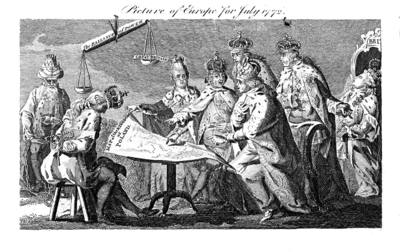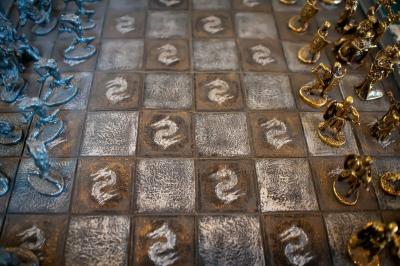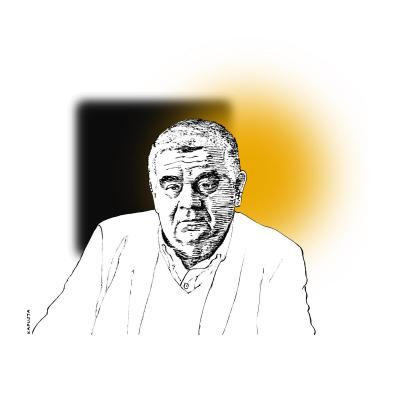I come from an intellectual family. My father was a professor of literature at the University of Warsaw and an expert on the Enlightenment, and my mother was a classical philologist; she taught Greek, Latin, and ancient history. I was brought up in the spirit of humanism and Western European culture. There was a portrait of Thomas Mann on my father’s desk, and engravings with images of Spinoza, Descartes, Leibniz, and Hume hung on the wall. During my youth, when Poland was under Soviet occupation, my parents would often say: “Rome, not Byzantium; Rome, not Constantinople. The roots of our culture are in Rome”. This was an allusive opinion that Poland had belonged to the Latin West since the beginning of its history and would not submit to eastern domination, no matter what form it took - tsarist, pan-Slavist or totalitarian.
So I assimilated this doctrine quite early on, which over time manifested itself in my interests and works. I devoted many years to the works of Samuel Beckett – “the fairest writer of Western civilisation”, as the Polish Nobel laureate Czesław Miłosz called him. I translated all his plays and other works into Polish; I commented on them and staged them in the theatre as a director. In the late 1970s, I got to know him personally and maintained correspondence with him. This is undoubtedly one of my most important spiritual experiences. In the 1990s, I wrote the Francophile novel Madame - a parody of the bildungsroman - in which I ironically showed how the prevailing cult of French art and fashion in Poland (if only lined with snobbery) saved society from spiritual degradation and declining morals under the regime imposed by Moscow. The book reached the finals of the IMPAC Dublin Literary Award in 2002, and its dtv edition was named novel of the year by German critic Tylman Krause in Die Welt. Finally, I have spent years reacquainting the Polish language with the European classics - from Sophocles, Shakespeare, Racine and Hölderlin to Kawafis and Eliot.
No wonder, then, that as soon as Poland regained its independence in 1989-1990, I became an advocate of joining NATO and the EU as quickly as possible; and in 2004, when this was finally possible, I re-translated Schiller’s Ode to Joy for music, so that the EU anthem could not only be read but also sung in Polish. My pro-European attitude and “cosmopolitan” stance were noticed by the French authorities, who, in addition to awarding me the Order of Arts and Literature, also invited me to the “Intellectuals for the EU” congress in Paris in 2005.
The paradox is that it was then that my Euro-enthusiasm began to wane instead of strengthening. Because there I saw things I knew from totalitarian systems that aroused my distrust and fear. I mean the cult of utopia, abstraction, and doctrine, and simultaneously the manipulation of ideas and intrusive propaganda. In other words, the game of appearances, with which I am well acquainted from history, whereby a minority presenting itself as a “Promethean vanguard” seeking to make humanity happy is, in fact, a power-hungry usurper seeking to dominate and enslave others. What offended me about all these manifestos and resolutions was their clamour and suspicious unanimity. Those who shouted the loudest about diversity, pluralism, tolerance, and respect for others were strangely intolerant, heated, and vicious in their beliefs. I was then reminded of the famous lumpen proletarian Edek’s line from the play Tango by Slawomir Mrożek, the most outstanding Polish playwright of the 20th century: "One is free to have one’s opinion - provided it is in line with ours".
Since then, my scepticism towards the EU - as a bureaucratic juggernaut, not as an original idea conceived by, among others, R. Schuman - has begun to grow and, over time, has developed into far-reaching reserve and criticism. This was also linked to a marked change in the policy of Brussels and Berlin towards Poland. As long as my country was making up for the losses and backlogs caused by nearly 50 years of communist rule, all was well. Poland was praised and held up as an exemplary leader in the systemic transformation. However, since - after 30 years or so - it has come closer to Western standards and, above all, has become competitive in some areas, the “laudations” have ended, and the criticism - and quite harsh - has begun. Poland, which after many years was breaking out into the realm of subjectivity and aspiring at last to become an equal partner rather than a perpetually nodding supplicant, was no longer to be liked.
Of course, no one formulated this explicitly. This would have been incompatible with the EU’s guiding ideas and slogans. They resorted to another method - as old as the world itself, by the way: false witness, slander, and denigration. Namely, it was proclaimed - almost overnight - that Poland is an illegitimate, intolerant, non-progressive state and, therefore, hampers the development of modern civilisation and even threatens its freedoms.
It would be hard to find a more blatant falsehood. The history of Poland - if you know it and do not distort the facts, of course - unequivocally proves that it was a state without stakes, multinational and multicultural, and, above all, non-aggressive compared to other European powers. There were no bloody revolutions and civil wars here like in France, Spain, or England (not to mention Russia), nor were there criminal expansions like Hitler’s conquest of Europe by Germany. On the other hand, the main weakness of Chopin’s and Copernicus’s homeland was, paradoxically... a surplus of freedoms and liberties. Poland collapsed in the 18th century precisely because its democracy was too progressive for the time. Catherine II’s Russia, Frederick II’s Prussia and Joseph II’s Austrian Empire strongly rejected Polish republicanism, which is why they destroyed it, wiping the Polish state off the map of Europe.
This is brilliantly illustrated by an engraving by an English (not Polish!) printmaker entitled Picture of Europe for July 1772, still kept in the British Museum in London and the Library of Congress in Washington. It shows the rulers of the leading European powers of the day (in addition to the three mentioned above, there is the King of Spain, the King of France and the King of Great Britain, slumbering on his throne) more or less actively deciding the fate of the Republic of Poland, while the last King of Poland, Stanisław August, with his hands tied behind his back and wearing a broken crown, sits with his head lowered and watches helplessly as his homeland is raped. It is worth looking at this engraving:

Does this allegory not bring to mind the current situation, where for a good few years, Poland has been pilloried by various EU institutions, such as the EC and the CJEU, and scolded like a farmhand by the master? Where is the consistency here? How is it possible that a country that for nearly 25 years has been the EU’s white-headed boy and held up as an example to others has suddenly become the black sheep and the scourge of humanity? How is it possible that a community, which in 1939 was the first to resist the fascist and communist onslaught, and in 1980 was the first to give the signal for the countries of central and eastern Europe to throw off the Soviet yoke and launch the Second Spring of Nations (even ten years before the fall of the Berlin Wall), suddenly turns out to be “retrograde”, “reactionary”, “obscurantist” and anti-democratic?
No, this is not possible, and the only explanation for this criticism or even hostility is that the European Union simply does not like the so-called conservative government in Warsaw. But this government - and it has been twice! - was democratically and incontestably elected. So why does the EU, citing the rule of law repeatedly, refuse to recognise this and is doing everything it can to bring the legitimate government in Poland to its knees?
Sophocles, in his tragedy The Women of Trachis, tells the story of the defeat of the most famous and powerful Greek hero, Heracles. It turns out that he, too - this benefactor of humanity who freed the Earth from numerous monsters and dangers - was not without guilt, and the sources of his sin were, as usual, egoism and pride. The thing is, when he had completed his titanic labours, commissioned to him by Eurytus, he had no desire to return to his ordinary life but continued to wander the world, seeking adventure and audacity. This is how he got to the king of Oechalia, where his lovely daughter caught his eye. He unscrupulously demanded her as his mistress, and when he was refused, he decided to do it by force. To this end, he first proclaimed the power of the King of Oechalia to be illegitimate (as “illegitimate” were any monsters he defeated), then raided the city, killed the king and abducted the girl he desired. What’s more, he brazenly and shamelessly sent her to his family home as a “second, younger wife”. This is what tipped the scales and determined his fate. For, in a desperate act to save her marriage, Deianeira anointed his dress with a treacherous love potion that proved fatal.
Does not this mythological story express the eternal sin of hybris brilliantly? Is not the present apodictic and arrogant Union reminiscent of the “late” daring Heracles, who, dazzled by his exploits and merits, considered himself equal to the gods and assumed that he was allowed everything - even to break his laws, use violence and disregard morality?
It is worth knowing the history. There have been similar situations in the past. In the 19th century, for example, Napoleon, a true son of the French Enlightenment, behaved this way, trying to impose his Code on Europe. And for him, the Law - that “greatest invention of mankind” - was supposed to be a tool for bringing about radical change: a move away from the post-feudal state to a modern, post-Christian social order. Famous is the reprimand he gave in 1807 to his younger brother Louis, King of the Netherlands, who, fearing the protests of his subjects, asked for a compromise. Impatient with his resistance, Napoleon persuaded him that the Code would in no way harm private estates, bring confusion to families, or cause disorder in the country. “It is a fairy tale”, he thundered, “which you have been told because the Dutch hate everything that comes from France. A nation of 180,000 heads cannot have separate legislation. If the Romans gave their laws to their allies, France too could adapt them to the Netherlands”.
Napoleon wanted to consolidate the whole of Europe through self-imposed rules. Political unification was to go hand in hand with institutional and civilisational unification based on a uniform and universal system of laws and associated common values. The code in this process was an indispensable instrument to prop up the violence of the hegemon under the guise of legalism. It was a very modern solution for the time. Nevertheless, it ended in a humiliating defeat in the memorable “Battle of the Nations” at Leipzig in 1813.
In the twentieth century, a similar defeat was inflicted by Soviet Russia, which for nearly half a century tried to impose on central and eastern Europe a uniform “socialist” system, which was supposed to bring paradise on Earth but brought hell.
Let us not repeat the old mistakes. Let the EU once again be a Europe of Homelands, a Europe of Nations, not a super-state dominated by utopia - one doctrine and one leadership. In other words: may Zeus - that “beloved Father'” who, in Schiller’s words, “dwells above the vault of stars” - speak to his will-powered son and restore him to order. Until it is too late.






Comments (0)